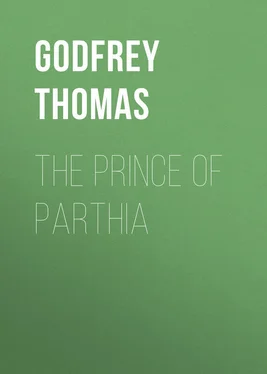Thomas Godfrey - The Prince of Parthia
Здесь есть возможность читать онлайн «Thomas Godfrey - The Prince of Parthia» — ознакомительный отрывок электронной книги совершенно бесплатно, а после прочтения отрывка купить полную версию. В некоторых случаях можно слушать аудио, скачать через торрент в формате fb2 и присутствует краткое содержание. Жанр: foreign_antique, foreign_prose, foreign_dramaturgy, на английском языке. Описание произведения, (предисловие) а так же отзывы посетителей доступны на портале библиотеки ЛибКат.
- Название:The Prince of Parthia
- Автор:
- Жанр:
- Год:неизвестен
- ISBN:нет данных
- Рейтинг книги:5 / 5. Голосов: 1
-
Избранное:Добавить в избранное
- Отзывы:
-
Ваша оценка:
- 100
- 1
- 2
- 3
- 4
- 5
The Prince of Parthia: краткое содержание, описание и аннотация
Предлагаем к чтению аннотацию, описание, краткое содержание или предисловие (зависит от того, что написал сам автор книги «The Prince of Parthia»). Если вы не нашли необходимую информацию о книге — напишите в комментариях, мы постараемся отыскать её.
The Prince of Parthia — читать онлайн ознакомительный отрывок
Ниже представлен текст книги, разбитый по страницам. Система сохранения места последней прочитанной страницы, позволяет с удобством читать онлайн бесплатно книгу «The Prince of Parthia», без необходимости каждый раз заново искать на чём Вы остановились. Поставьте закладку, и сможете в любой момент перейти на страницу, на которой закончили чтение.
Интервал:
Закладка:
Thomas Godfrey
The Prince of Parthia A Tragedy
THOMAS GODFREY, Jr
Thomas Godfrey, Jr., was born in Philadelphia, on December 4, 1736, the son of a man who himself won fame as an inventor of the Quadrant. Godfrey, Senior, was a friend of Benjamin Franklin, the two probably having been drawn together by their common interest in science. When Godfrey, Senior, died, December, 1749, it was Franklin who wrote his obituary notice. 1 1 A notice appeared in the Pennsylvania Gazette , December 19, 1749. See Scharf and Westcott's "History of Philadelphia" for references to Godfrey, Sr. Therein is given a picture of his house in Germantown, Pa. Barlow mentions him in his "Columbiad." A monument to his memory was erected in Laurel Hill Cemetery, Philadelphia, 1843. Note that David Rittenhouse, an American dramatist who translated, from the German, "Lucy Sampson; or, The Unhappy Heiress" (1789), was likewise a mathematical genius.
Young Godfrey was a student at the College or Academy of Philadelphia, and when his education was completed, he became apprenticed to a watch-maker, remaining in that profession until 1758. As a student at the Academy, he came under the special influence of Dr. William Smith, the first Principal or Provost of that institution, 2 2 Accounts of Dr. Smith are to be found in Henry Simpson's "Eminent Philadelphians"; Scharf & Westcott's "History of Philadelphia," ii, 1126. Dr. Smith's "Life and Correspondence," by Horace Wemyss Smith, was issued in 2 vols., 1879.
and it was Dr. Smith who not only obtained for Godfrey a lieutenancy with the Pennsylvania troops in 1758, which sent him in the expedition against Fort Duquesne, but who, likewise, as the Editor of The American Magazine , was only too glad to accept and publish some of Godfrey's poetical effusions.
That the young man was popular, and that he associated with some of the most promising figures of the time, will be seen from the fact that, although he was only twenty-seven when he died, he was counted among the friends of Benjamin West and John Green, both portrait painters, of Francis Hopkinson, who was a student at the College of Philadelphia, and of Nathaniel Evans, a young minister whose loyalty found outlet after Godfrey's death in the Memorial Edition of Godfrey's works. Evans himself wrote poems and dialogues. In his confirmation of the fact that, as a poet, Godfrey was regarded favourably by the Philadelphians of the time, he quotes from the diary of one Miss Sarah Eve, who referred to him as "our poet."
Godfrey's reputation, as a young man with musical talents and a decided taste for painting, has come down to us. Certain it is that, during all of this time of varied occupation as a watch-maker and a soldier, he must have been courting the poetic Muse. There are some who speculate, without authority, on his having been a theatre-goer, and having become inspired as a playwright by the work of the American Company, in Philadelphia; especially by the good work of Douglass. Because of insufficient evidence, that is a question which remains unproven. Nevertheless, it is certain, from an extant letter written by Godfrey on November 17, 1759, and quoted by Seilhamer, that he must have had his attention turned to playwriting as a special art. He says to his correspondent, writing from North Carolina:
By the last vessel from this place, I sent you the copy of a tragedy I finished here, and desired your interest in bringing it on the stage; I have not yet heard of the vessel's safe arrival, and believe if she is safe it will be too late for the company now in Philadelphia. [Meaning, of course, Douglass's company.]
There are two facts to be noted in this communication: first, that it was written from North Carolina, where, in 1759, Godfrey had gone on some plantation business – probably as factor; and second, that it must have been penned with the idea of immediate production by the actors in Philadelphia. According to Seilhamer, Godfrey remained in North Carolina for three years. He did not write the entire manuscript of "The Prince of Parthia" while living in the South but, as he definitely states in his letter, finished it soon after his arrival.
There is no evidence as to why Godfrey sailed to the Island of New Providence in the last year of his life, and then returned to Wilmington, N.C. There is no definite statement as to whether he contracted fever and had a sunstroke on that expedition, or after his return home. But, nevertheless, he did contract the fever and have a sunstroke; with the result that he succumbed to his illness, and died near Wilmington, North Carolina, on August 3, 1763. 3 3 Visitors to Wilmington, N.C., will be taken to Old St. James's Church-yard, where Godfrey lies buried.
After his death, Godfrey's friends decided among themselves that the young man was too much of a genius for them to allow his productions to remain scattered and unrecognized. Evidently, correspondence regarding this must have taken place between Dr. Smith, Nathaniel Evans, the young minister, and John Green, the portrait painter. For, in 1765, a book was published, entitled "Juvenile Poems on Various Subjects, with the Prince of Parthia," printed in Philadelphia by one Henry Miller. 4 4 Juvenile Poems/on/Various Subjects./With the/Prince of Parthia,/A/Tragedy,/By the Late/Mr. Thomas Godfrey, Junr./of Philadelphia./To which is prefixed,/Some Account of the Author and his Writings./Poeta nascitur non fit. Hor./Philadelphia,/Printed by Henry Miller, in Second-Street./M DCC LXV.
The volume contained a life written by Evans, a critical estimate written by Dr. Smith, of the College of Philadelphia, and an Elegy from the pen of John Green, who had been previously complimented by Godfrey in a poem entitled "A Night Piece." The whole spirit of the publication was one of friendly devotion and of firm belief in the permanency of Godfrey's position in the literary world. As was the custom of the time, the Edition was issued under the patronage of subscribers, a list being included. We know, for example, that Benjamin Franklin subscribed for twelve copies, his own private, autographed copy having been put on sale a few years ago.
As yet, no concerted effort had been made for the production of Godfrey's "The Prince of Parthia." We do not know if, during this time, the American Company had any claim on the manuscript, or whether, after Godfrey's death, it was again submitted to the theatrical people. But this much we do know, that, very hastily, the American Company, headed by David Douglass, who was playing at the Southwark Theatre in Philadelphia, decided that they would put on "The Prince of Parthia" in place of "The Disappointment; or, the Force of Credulity," a comic opera which will be noted in my introduction to John Leacock's "The Fall of British Tyranny." This musical piece had actually been put into rehearsal in 1767, when it was withdrawn. Immediately, the Pennsylvania Journal and Weekly Advertiser for April 23, 1767, contained an advertisement of the forthcoming production; it ran as follows:
By Authority./Never Performed before./By the American Company,/at the New Theatre, in Southwark,/On Friday, the Twenty-fourth of April, will be/presented, A Tragedy written by the late ingenious/Mr. Thomas Godfrey , of this city, called the/Prince of Parthia./The Principal Characters by Mr. Hallam,/Mr. Douglass, Mr. Wall, Mr. Morris,/Mr. Allyn, Mr. Tomlinson, Mr. Broad/belt, Mr. Greville, Mrs. Douglass,/Mrs. Morris, Miss Wainwight, and/Miss Cheer./To which will be added, A Ballad Opera called/The Contrivances./To begin exactly at Seven o'clock . — Vivant Rex & Regina. /
In the Pennsylvania Gazette , for the same date, appears an advertisement, without the cast of characters.
Читать дальшеИнтервал:
Закладка:
Похожие книги на «The Prince of Parthia»
Представляем Вашему вниманию похожие книги на «The Prince of Parthia» списком для выбора. Мы отобрали схожую по названию и смыслу литературу в надежде предоставить читателям больше вариантов отыскать новые, интересные, ещё непрочитанные произведения.
Обсуждение, отзывы о книге «The Prince of Parthia» и просто собственные мнения читателей. Оставьте ваши комментарии, напишите, что Вы думаете о произведении, его смысле или главных героях. Укажите что конкретно понравилось, а что нет, и почему Вы так считаете.












